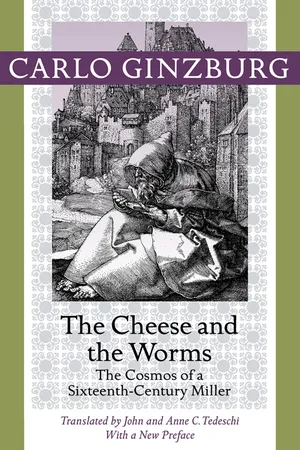
The Cheese and the Worms
The Cosmos of a Sixteenth-Century Miller
- English
- ePUB (mobile friendly)
- Available on iOS & Android
The Cheese and the Worms
The Cosmos of a Sixteenth-Century Miller
About this book
The now-classic tale of a sixteenth-century miller facing the Roman Inquisition.
The Cheese and the Worms is an incisive study of popular culture in the sixteenth century as seen through the eyes of one man, the miller known as Menocchio, who was accused of heresy during the Inquisition and sentenced to death. Carlo Ginzburg uses the trial records to illustrate the religious and social conflicts of the society Menocchio lived in.
For a common miller, Menocchio was surprisingly literate. In his trial testimony he made references to more than a dozen books, including the Bible, Boccaccio's Decameron, Mandeville's Travels, and a "mysterious" book that may have been the Koran. And what he read he recast in terms familiar to him, as in his own version of the creation: "All was chaos, that is earth, air, water, and fire were mixed together; and of that bulk a mass formed—just as cheese is made out of milk—and worms appeared in it, and these were the angels."
Ginzburg's influential book has been widely regarded as an early example of the analytic, case-oriented approach known as microhistory. In a thoughtful new preface, Ginzburg offers his own corollary to Menocchio's story as he considers the discrepancy between the intentions of the writer and what gets written. The Italian miller's story and Ginzburg's work continue to resonate with modern readers because they focus on how oral and written culture are inextricably linked. Menocchio's 500-year-old challenge to authority remains evocative and vital today.
Frequently asked questions
- Essential is ideal for learners and professionals who enjoy exploring a wide range of subjects. Access the Essential Library with 800,000+ trusted titles and best-sellers across business, personal growth, and the humanities. Includes unlimited reading time and Standard Read Aloud voice.
- Complete: Perfect for advanced learners and researchers needing full, unrestricted access. Unlock 1.4M+ books across hundreds of subjects, including academic and specialized titles. The Complete Plan also includes advanced features like Premium Read Aloud and Research Assistant.
Please note we cannot support devices running on iOS 13 and Android 7 or earlier. Learn more about using the app.
Information
Table of contents
- Cover
- Title Page
- Copyright Page
- Contents
- Preface to the 2013 Edition
- Translators’ Note
- Preface to the English Edition
- Preface to the Italian Edition
- Acknowledgments
- 1 Menocchio
- 2 The town
- 3 First interrogation
- 4 “Possessed?”
- 5 From Concordia to Portogruaro
- 6 “To speak out against his superiors”
- 7 An archaic society
- 8 “They oppress the poor”
- 9 “Lutherans” and Anabaptists
- 10 A miller, a painter, a buffoon
- 11 “My opinions came out of my head”
- 12 The books
- 13 Readers of the town
- 14 Printed pages and “fantastic opinions”
- 15 Blind alley?
- 16 The temple of the virgins
- 17 The funeral of the Madonna
- 18 The father of Christ
- 19 Judgment day
- 20 Mandeville
- 21 Pigmies and cannibals
- 22 “God of nature”
- 23 The three rings
- 24 Written culture and oral culture
- 25 Chaos
- 26 Dialogue
- 27 Mythical cheeses and real cheeses
- 28 The monopoly over knowledge
- 29 The words of the Fioretto
- 30 The function of metaphors
- 31 “Master,” “steward,” and “workers”
- 32 An hypothesis
- 33 Peasant religion
- 34 The soul
- 35 “I don’t know”
- 36 Two spirits, seven souls, four elements
- 37 The flight of an idea
- 38 Contradictions
- 39 Paradise
- 40 A new “way of life”
- 41 “To kill priests”
- 42 A “new world”
- 43 End of the interrogations
- 44 Letter to the judges
- 45 Rhetorical figures
- 46 First sentence
- 47 Prison
- 48 Return to the town
- 49 Denunciations
- 50 Nocturnal dialogue with the Jew
- 51 Second trial
- 52 “Fantasies”
- 53 “Vanities and dreams”
- 54 “Oh great, omnipotent, and holy God …”
- 55 “If only I had died when I was fifteen”
- 56 Second sentence
- 57 Torture
- 58 Scolio
- 59 Pellegrino Baroni
- 60 Two millers
- 61 Dominant culture and subordinate culture
- 62 Letters from Rome
- Notes
- Index of Names